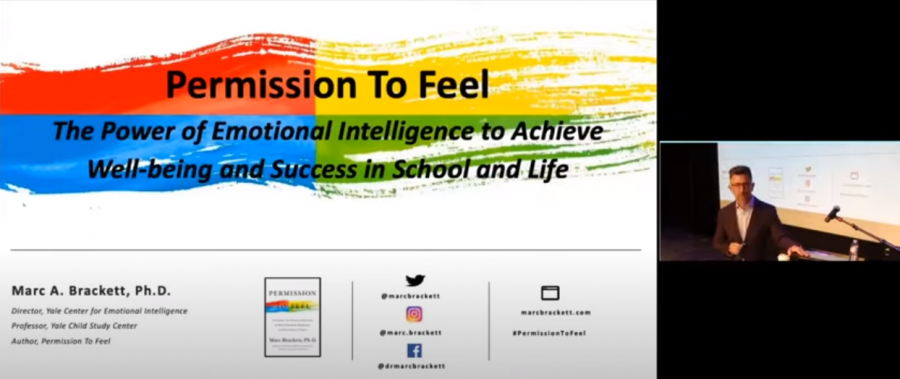Advocating for empathy
The annual Walnut Valley Unified School District Parent Symposium, broadcast live on YouTube on Oct. 23, focused on educating parents about their childrens’ emotional well-being.
This year’s presentation featured Dr. Marc A. Brackett, a research psychologist and the Founding Director of the Yale Center for Emotional Intelligence, as well as a Professor in the Child Study Center at Yale University.
Brackett’s presentation, “Permission to Feel,” centered on the power of emotional intelligence and the importance of children learning to express their feelings through their words.
“It’s interesting, isn’t it? We have a vocabulary for things like science and math. I do a lot of work in the tech industry, and they have so many words to describe their programs. But yet, when I say, ‘How are you feeling?’ It’s like, ‘Uh, fine’,” Brackett said.
As an exercise, he displayed a mood meter that featured only colors, then asked the audience which color they were feeling.
“It may seem like a simple question,” he said. “But we find most people in our research have trouble finding the words.”
Brackett emphasized the idea that, in order for parents to help, children need to feel comfortable talking to them. He described the ideal parent as one who possesses “Permission to Feel ” characteristics, including compassion, empathy, as well as being non judgmental and supportive.
He also discussed the difference between “emotion scientists” and “emotion judges,” with the former referring to individuals who are more open-minded, curious and reflective while the latter relates to those who are more critical and tend to ignore emotions; he concluded that children are more likely to talk about their feelings if their parents are “emotion scientists” rather than “emotion judges.”
“Your children are watching you,” Brackett said. “Your children are listening to you. So I ask all of you, are you role models for being an emotion scientist? Or are you role models for being an emotion judge?”
To expand on the importance of recognizing emotions in oneself and others, Brackett played a facial expression guessing game with the parents. The game demonstrated the parents’ need to build relationships with their children and encourage open communication.
“So what I’m here to tell you is that we overestimate our skill at reading our children [and] overestimate our skill at reading most people in the world around us,” Brackett said. “The only way to get to know how your child is feeling is to build a relationship with them and have those conversations about how they’re feeling.”
Additionally, he stressed the significance of maintaining balance when it comes to academic performance and mental health.
“There is another side of the report card,” Brackett said. “That other side is called emotional intelligence. We need these skills to achieve our dreams in life.”
Your donation will support the student journalists of Diamond Bar High School. Your contribution will allow us to purchase equipment and cover our annual website hosting costs.









